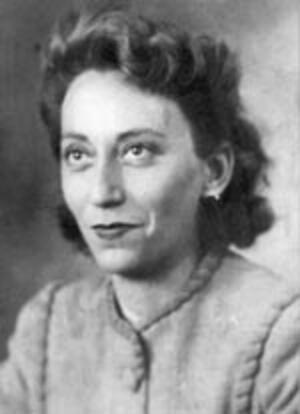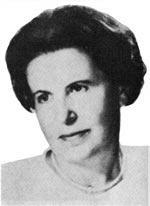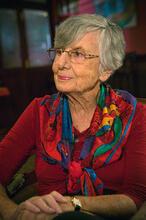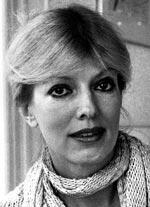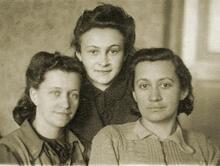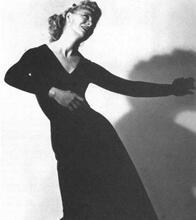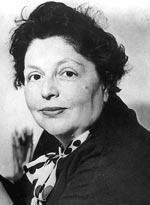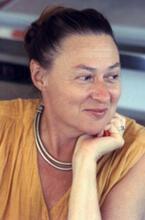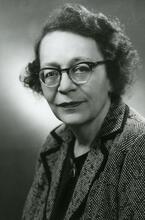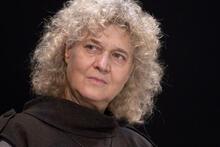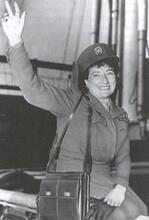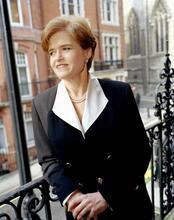Jacqueline Mesnil-Amar
Born in a Paris suburb in 1909 to a wealthy Jewish family, Jacqueline Mesnil-Amar grew up in an assimilated home, rarely engaging or connecting with Judaism. Her journal, which documented Paris during the war, was published in 1957. This diary recounts her daily life, the anxieties and fears she had, and criticism of the French, who did not attempt to protect Jewish citizens. After the war, Mesnil-Amar and her husband turned to Judaism, studying Jewish material, learning Hebrew, and traveling to Israel several times. Her life story and published journal reveal the difficulties faced by assimilated French Jews and the failures of the French government during World War II.
Few testimonies to the plight of French Jews during and after World War II are as moving and as eloquent as those of Jacqueline Mesnil-Amar. Few writers describe so wrenchingly the drastic psychological and material schism that resulted from the Vichy government’s abandonment of its Jewish population during the Holocaust. Mesnil-Amar is especially perceptive in her description of the state of mind of the assimilated Jews who had been in France for generations, who felt that they had earned their place among the haute bourgeoisie, and who ignored the plight of their coreligionists from the east (the Jews “with accents”) before they were themselves betrayed by the Vichy regime.
Early Life and World War II
Mesnil-Amar (her nom de plume) was born on April 23, 1909, the daughter of Jules Perquel (1871–1953), whose family came from the northeastern province of Lorraine, and Ellen Allatini (1880–1972), from a well-established Italian family. In her essay “Nous étions les Juifs de l’oubli” (We were the Jews of forgetting), Jacqueline describes the idyllic life of wealthy Jews in the Paris suburb of Passy, complete with governesses, receptions, riding lessons, and summers at the seashore. The family’s contact with Judaism was limited to attendance at synagogue during the high holy days and a pro forma “religious initiation.” When the war came, these assimilated Jews found themselves totally lacking in any knowledge of Judaism that might have helped counter the assault on their identity.
In 1930 Jacqueline Perquel married André Amar (1908–1990) whose family had emigrated from Salonika. André and Jacqueline shared a love of literature and an interest in philosophy. Both were intensely patriotic. Following her marriage, Jacqueline finished her studies in literature at the Sorbonne while André joined the family bank. They had a daughter, Sylvie (b. 1934). The couple’s easy, though in Jacqueline’s eyes somewhat boring, existence was shattered by the outbreak of the war. In 1942, André joined the Organisation Juive de Combat (Jewish Combat Organization), a resistance network operating in the south of France. He was arrested in July 1944 and deported on the last train to Auschwitz, from which he managed to escape. All of his family perished in Auschwitz.
Post-War Life
After the war André and other members of his combat unit, feeling that their primary responsibility was to the returning deportees, founded the Service Central des Déportés Israélites (SCDI) (Central Service for Jewish Deportees). Jacqueline edited the SCDI publication in 1945–1946 and wrote several articles for it. Mesnil-Amar was driven by the need to testify imposed on her by the returning deportees she met at the Hotel Lutetia, some still with shaved heads and in their concentration camp clothes. “Dites-leur surtout …” (You must tell them). In 1957 the diary she had kept before the liberation of Paris, when she was without news of her husband, was published as Journal des temps tragiques (Diary of Tragic Times) together with some of the articles she had written for the SCDI, under the title Ceux qui ne dormaient pas (Those Who Did Not Sleep). Her diary recounts the anxieties of daily life in Paris as she tried to maintain a semblance of normality for her daughter, the struggle for food, the constant fear of arrest, and the attempt to maintain a sense of dignity. The articles written immediately after the war are full of pity for the plight of the orphaned children, both the very young ones who understood little about the disappearance of their parents, and the older ones who understood only too well. In the essay “Ceux qui dorment la nuit” (Those who sleep at night) she holds everyone responsible for the tragedy, the French as well as the Germans, and her own class of assimilated Jews who had ignored the plight of their less well-off brethren. She is especially harsh with the French who, at all levels of the bureaucracy and in every walk of life, sold out the Jews to the occupiers and who, after the war, were only too willing to forget. At the same time she acknowledges the succor of humble French people—a concierge, a servant—who risked their lives in sheltering Jews.
Mesnil-Amar’s Jewish Life
Both Mesnil-Amar and her husband turned to Judaism after the war, a Judaism which, in the words of their daughter Sylvie Jessua-Amar, they had to learn word by word because they had not lived it. They became friends with the prominent Jewish intellectuals André Spire (1868–1966) and Edmond Fleg (1874–1963), began learning Hebrew, and made several trips to Israel. Jacqueline wrote on Jewish themes—on Jewish writers as well as on the ways in which Jews were represented in French literature—for several journals, most notably for the Nouveaux Cahiers, the journal of the Alliance Israélite Universelle. At the invitation of Emmanuel Lévinas (1905–1995) she gave several lectures on Jewish writers, among them Franz Kafka and Marcel Proust. Her essay on Proust’s mother Jeanne Weil evokes the Jewish haut bourgeois milieu in which Weil had been raised and which Mesnil-Amar knew well, uncovering a persistent Jewish outlook even among those who had discarded religious practices.
To the end Jacqueline Mesnil-Amar remained torn between her allegiance to the country of her birth, between the French culture, inseparable from her identity, and her allegiance to the Jewish people. She felt “incapable, evidently, even today, of letting go of the Jews nor of leaving France.” She called the Jews of her generation “the empty Jews, the lacking Jews” (“Juifs du vide, juifs du manque”). She was, she realized, “much too Jewish for some, not at all for others,” and wonders, “Was I Jewish enough for myself?” In long sinuous phrases that bear the mark of her profound European culture, she documented the failure of the project of assimilation that had been the goal of French Jews since their emancipation at the time of the French Revolution.
Selected Works
Ceux qui ne dormaient pas. Fragments de journal, 1944–1946. Paris: Les Éditions de Minuit, 1957.
“Racisme et snobisme chez Marcel Proust.” La Nef. Cahier Trimestriel 19–20 (1964): 173–182.
“Un Poète … un ami.” Europe: Revue Littéraire Mensuelle 467 (1968): 240–247.
“Marcel Proust, les juifs et le monde.” Les Nouveaux Cahiers 19 (1970): 35–45.
“Nous étions les juifs de l’oubli.” Les Nouveaux Cahiers 50 (1977): 43–49.
Bitton, Michèle. “Jacqueline Mesnil-Amar.” In Présences féminines juives en France. Paris: Publisud, 2002.
Israël, Gérard. “Jacqueline Mesnil-Amar.” Les Nouveaux Cahiers 89 (1987): 408.
Jessua-Amar, Sylvie. “André et Jacqueline Amar, mes parents.” Sens 7–8 (1994): 291–299.

